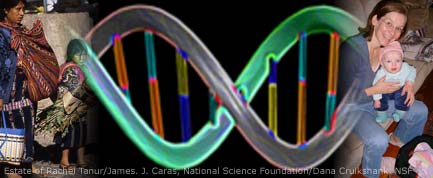Reality Check: Genetic Test to Tell How Long You'll Live?

Researchers in Spain say they're close to marketing a genetic test that could tell consumers how fast they are aging and, potentially, how long they will live. But experts say that such claims are false.
The Independent, a British newspaper, reported today (May 16) scientists are developing a blood test that would measure the length of an individual's telomeres, or caps on the tips of chromosomes that protect the chromosomes from damage. Telomeres are thought to play a role in aging, and previous studies have found an association between telomere length and lifespan.
The test would tell an individual if their "biological age" — the age of their cells — matches their chronological age, the Independent reported. This information, in turn, might tell a person how many years of his or her life remain. The researchers hope to market their test to the general public later this year, sold by the company Life Length.
Estimating biological age
However, experts argue that the scientific understanding of telomeres is not at the point where such a test would be accurate. We know telomere length changes with age, said Carol Greider, a geneticist at John Hopkins School of Medicine in Baltimore who studies telomeres. But in the general population, the length of people's telomeres varies widely. A 20-year-old and a 70-year-old might have telomeres that were the same length, Greider said.
"We cannot tell how old a person is by looking at their telomeres," Greider told MyHealthNewsDaily. In addition, you can't tell someone they have the cells of a 50-year-old, even though they're 20, she said. "I would say that it is not possible to tell a persons 'biological age' from their telomere length," Greider said. If a test says it will tell you how long you will live "clearly that's not true," she said.
Others say it is possible to get a ballpark "biological age" by looking at an individual's telomeres. But it's essential to have information on additional factors as well, including the person's gender, age when they gave the test, family history of disease, smoking history and how often they are exposed to sun, all of which can influence telomere length, said Gil Atzmon, a researcher at the Albert Einstein College of Medicine in New York who has studied the genetics of aging. Taking all this information into account, you could estimate a person's biological age, but the accuracy would be skewed by 5 to 10 percent, Atzmon said. That means, if a test predicted your biological age was 50, your real biological age could be between 45 and 55, Atzmon said.
Sign up for the Live Science daily newsletter now
Get the world’s most fascinating discoveries delivered straight to your inbox.
The researchers say they will determine the percent of very short or "dangerous" telomeres within a cell.
"A short telomere represents a persistent and non-repairable damage to the cells, which is able to prevent their division or regeneration," said Maria Blasco, inventor of the test and researcher at the Spanish National Cancer Research Centre in Madrid. The researchers hope to construct a database of telomere length values for the general population so they can tell "whether the percentage of short telomeres of a given person is within normality for a given age or indicates a younger or older biological age," Blasco told MyHealthNewsDaily.
The genetic test would take into account other factors that affect aging, Blasco said.
However, Blasco stresses, "We will not tell the clients how long they will [live]."
Looking at the length of telomeres does have some known clinical uses. Individuals with the shortest telomeres — shorter than 99 percent of the population — are at risk for certain diseases, including bone marrow failure and lung disease, Greider said.
Consumer interest?
Jerry Shay, a professor at the University of Texas Southwestern Medical Center in Dallas and a consultant for Life Length, said consumers would be interested in such information. "I think people are just basically curious about their own mortality. If you ask people what they worry about, most people would say they are worried about dying," Shay told the Independent.
He added: "People might say 'If I know I'm going to die in 10 years I'll spend all my money now,' or 'If I'm going to live for 40 more years I'll be more conservative in my lifestyle.'"
Greider said it's up to consumers whether they want to have this information, but up to scientists to make sure the public understands the true meaning of the results.
"It's a very personal choice whether somebody wants to know their genetic status," Greider said. "It is up to [scientists] to accurately say what we understand the genetic changes mean," she said.
Pass it on: Experts question the accuracy of a genetic test that would use telomere length to tell an individual how fast they are aging.
This story was provided by MyHealthNewsDaily, a sister site to LiveScience. Follow MyHealthNewsDaily staff writer Rachael Rettner on Twitter @RachaelRettner.

Rachael is a Live Science contributor, and was a former channel editor and senior writer for Live Science between 2010 and 2022. She has a master's degree in journalism from New York University's Science, Health and Environmental Reporting Program. She also holds a B.S. in molecular biology and an M.S. in biology from the University of California, San Diego. Her work has appeared in Scienceline, The Washington Post and Scientific American.









